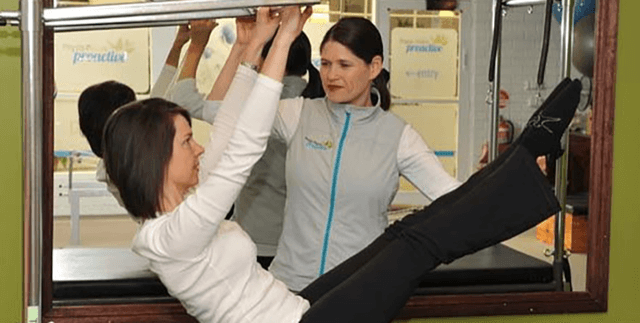
Physios on Pilates reform – Rachel Combe

Rachel Combe, APAM
Director at Physio Pilates Proactive
APA Physiotherapy Business group member
Physio Pilates Proactive Director Rachel Combe, APAM, says rebates will not be available for preventative Pilates sessions including 50-60 weekly mat classes and reformer classes at her three practices from 1 April.
'The majority of the clients have been supportive of us as a small business. They say: "We will keep coming".'
Can you explain how you use Pilates in your clinic and if that will change as a result of the reforms?
The practice itself has 14 physiotherapists who all have Polestar Pilates Rehabilitation training so it's a massive part of our business. It forms at least 60 per cent of what we do, from one-on-one rehabilitation to maintenance-type classes. We do run a lot of Pilates equipment group sessions but one of our big points of difference compared to other physiotherapy clinics is we run about 50 or 60 mat and reformer classes between our three practices. Mat classes and reformer classes are more about prevention of injuries and maintaining physical health. They are also pure Pilates classes. Therefore, clients won't be able to claim these types of classes from 1 April.
What else are you doing to prepare for the changes?
What rehabilitation sessions are called
We will rename our Pilates rehabilitation sessions to physiotherapy rehabilitation sessions. They fulfill the criteria with these clients being assessed regularly, there are outcome measures and treatment goals that are constantly monitored. There's a huge component of normal physiotherapy rehab exercises in their program, so that's an easy one to change and we can do some subtle changes on the website.
Pilates name
With the 50 to 60 mat and reformer classes we decided that it's just crazy to think you can just change the name. We specialise in teaching pure Pilates classes and it is something we want to leverage as part of our business. .We would rather lose a few clients initially with them not be able being able to claim, but then move on from there.
Clinical notes
We will continue to write notes for Pilates classes regardless of these health fund changes from an indemnity insurance point of view. We write thorough SOAP notes for our individual and group rehabilitation sessions.
Monitoring
We're going to increase the frequency of reassessment for our rehabilitation patients to a maximum of three months before review and in some cases, this will be earlier to assess patient outcomes and treatment goals.
Patient communication
We've advised our patients of their options - if they're already doing an equipment program then they will need to do a re-assessment pre-April to get an updated clinical picture of each patient’s condition. If they're doing Pilates mat or Reformer classes, then we have told them that they won't be claimable.
Business name
We are allowed to keep our business name with Pilates in it – and we are offering Pilates classes, clients just won’t be able to claim.
How do you think patients will react to the changes?
I think most of our clients thankfully appreciate that this is a government decision, not a discretionary one from a practice point of view. Interestingly enough, the majority of the clients have been supportive of us as a small business. They say: ‘We will keep coming. We value the service which you offer.’ Patients also seem to appreciate their health fund rebates have decreased over time, so this is just the final part of that process.
Anything else you’d like to add?
I hope that we've done enough with our branding and client loyalty. My gut feeling is that we will lose about 20 per cent of our regulars and then maybe about 10 per cent of those will return when they realise that they don't feel as good as they used to.
Read more about how the PHI natural therapies reform and how they will affect your practice here.
